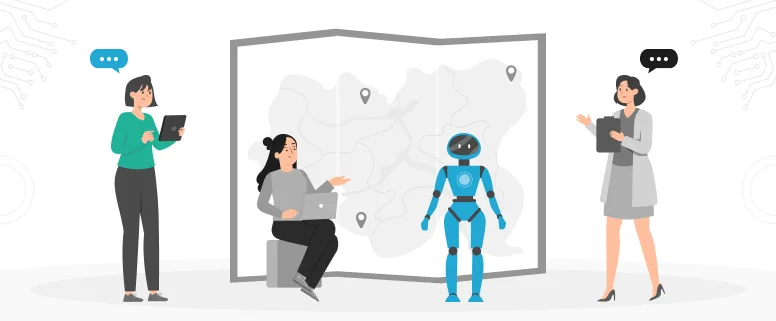The new age of the internet has exerted quite a big impact on every field of life and technology. Today, one can execute tasks that were impossible to do so a few decades ago. Not only that, the internet has opened doors for innovation and improvement in all aspects of life, be it business, science, or technology.
One thing that the internet has affected strongly is language. With the spread of usage of the internet, gadgets such as mobile phones and computers had to be made more advanced as well. And while these gadgets play a major role in making communication possible, a suitable language is always required for meaningful correspondence, particularly across borders.
With the help of the internet, a Filipino assistant can organize electronic diaries for Silicon Valley officials, and German consumers can read product information written in Chinese on eBay.
Moreover, the use of AI and the internet accessibility of these AI-based tools has also greatly changed communication between people. Especially among professionals, there are both negative and positive impacts of this change. On language in terms of translation it provides us with a quick tool, but then again is highly susceptible to errors. Human intervention is still required to operate these tools. Internet language learning is also based on collected data, so hence can be inaccurate in niches. In the future, we may see AI assistants helping people across borders communicate effectively. Such is the impact of the internet.
The question that arises here is—how is the internet affecting language? The written English language is free from any abbreviations and slang, but with the advancement in the internet, the words used for communication have shortened considerably.
People today are communicating with each other like never before, by using abbreviations, spaces, keystrokes, emojis, and acronyms. Anyone can see that the use of these “abbreviated languages” has badly affected the language of communication globally.
Table of Content
Internet and the “Shortened” Language
Believe it or not but Facebook has given an entirely different meaning to words like tags, statuses, and posts. As a matter of fact, Facebook is considered one of the most well-known social media sites. Therefore, whatever language is used, gets adopted by a large number of people around the globe.
India, in particular, ranks high in traffic on Facebook, as Indians are quite fond of English and have thus unconsciously contributed to making it an international language. This is the reason some words commonly used on the internet language today have Indian origins, such as “Guru” and “Avatar”.
The emails written today are also different from those written in the past. Conventions such as “KR”, which stands for “Kind Regards” have become a trend today. The impact of the Internet has also promoted the use of slang language and abbreviations previously unknown by people.
For example, very few people know what “DS” and “DD” stand for—dear son, and dear daughter, respectively. However, some words have become so popular that they have made their way to mainstream media and social media platforms, such as the word “LOL”, which stands for “laugh out loud”.
Negative Impact of the Internet on Language
While the internet language has played a huge role in making lives easier for many, opening up new avenues of communication, it has also led to the ruin of the English language as we know it. The people of today are commonly using the language used on the internet—the one that has completely destroyed the grammar and writing skills of the young generation.
For example, American English speakers use the term “I am” as “I’m” on their smartphones while texting or emailing. Although slang words had been created solely for the use of small-knit societies such as musicians and their followers, they are being used in more visible environments such as on Facebook and YouTube comments sections.
Internet and Growth in the Use of Languages
The spread of the “internet” language has a tendency to be adopted quickly by its users—the terms written by a specific group quickly become a part of the communication of a larger community on the internet.
For example, the term ‘Bae’ is used for referring to a romantic partner, as it assists the user in protecting his/her gender online, while also facilitating them with a short phrase for “my girlfriend/boyfriend”. This word is now being commonly used on Facebook, Reddit, and Instagram.
These internet activities taking place by the users signify the value of short words and terms. In fact, it can be said that the major contribution of the impact of internet ono the growth of language is the encouragement of using shorter forms of words instead of using lengthy and hard-to-type terms.
People who say that the internet will make a fresh international creole form of a language actually have misunderstood the development of creole languages. Creole languages are created by the fusion of different languages. Sometimes this fusion is adopted as a language.
For instance, in Haiti, Haitian Creole is used as an official language. However, the internet is not “creolizing” the chief body of the English language, even with various non-native speakers texting in their own languages online.
The Exchange of Ideas
The internet proposes many opportunities for different speakers to use different languages for communicating with each other as well. These also open doors for new exchange of ideas. British and American English both are being used in an identical network platform, which leads to the planting of conventions like fresh words, terms, and spellings across both languages. This fuels and gives birth to new ideas and words that ultimately form a part of the language used in common communication.
In the year 2011, Drake, a recording artist from Canada used the word YOLO on Twitter which is an abbreviation of” You Only Live Once”. After that, Twitter analytics websites observed the high use of this all over the internet. YOLO has become so commonly used a term that it was a shock for everyone when Ed Miliband, the British opposition leader, said that he never heard of such a term.
Despite the fact that YOLO had previously cropped up in different pop tracks and rap, it is noted that this time it will become more conventional. In short, the internet has played a role in the constant exchange of ideas and is providing great assistance in the process of speeding things up.
The Internet and Language Diversity
As everyone knows, English dominates the internet; the sum of English language content overshadows the number of mother-tongue speakers globally. It has been estimated that almost 80% of network content is based on one of ten languages, out of which most of the work is carried out in German, Korean, and Russian languages. However, this is changing, yet there are some groups of languages comprising millions of users that have a small number of local language contents online.
Language diversity on the internet seems to be booming all across multilingual states and regions. For instance, Africa and India are creating their own online content. Websites like Facebook currently are accommodating other languages.
On the other hand, smaller languages that are even practiced by countless people won’t be able to reach the same position or quality of content as other leading internet languages like Spanish and Arabic.
Language, the foremost tool of communication, has the ability to strengthen the majority of languages at the cost of minority ones. That’s probably the ultimate change that has been brought by the impact of internet on the language universally.
The Last Word
Although the internet language has contributed strongly to making advancements in the field of business, science, and technology possible, its contribution to the world of languages is sometimes overlooked. Unconsciously, it has changed the way people communicate with each other via the internet, on social media platforms, and through emails. However, while the effect has mostly been to “shorten” the language, it has also made communication much faster and easier than before.



